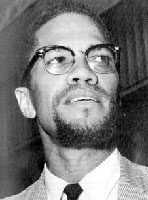Islam, Malcolm X and the right to self-determination
By
Larry Hales
Published Aug 10, 2006 2:42 AM
|
Malcolm X played a prominent
role in the anti-racist,
anti-imperialist movement.
|
Hezbollah and Hamas, both Islamic organizations,
play leading roles in the Lebanese and Palestinian resistance movements,
respectively. The Israeli settler government has tried to break both
organizations, as they have increasingly taken up the mantle of the resistance
to U.S. imperialism.
In the face of mounting aggression to attempt to
stamp out the will and determination of the Lebanese and Palestinian peoples,
Hezbollah and Hamas have increasingly come under fire, including being labeled
as “terrorists.”
Unfortunately, the role of Islam in the
struggle against imperialism confuses some in the progressive movement, but it
shouldn’t. The struggle of oppressed peoples for self-determination can
and has emerged in different forms, including religious ones, and is best judged
by the oppressed, not by ideologues from the oppressor nation.
If one
would take, for example, the contributions of Malcolm X to the struggle of Black
people in the U.S. for sovereignty and dignity, it would be difficult, perhaps
contemptible and disingenuous, to leave out the fact that he was a Muslim and
emerged from an Islamic movement.
Malcolm X did split from the Nation of
Islam after being silenced by Elijah Muhammad. His main reason for leaving the
NOI was because he was moving in another political direction. Malcolm began to
develop a broader, internationalist view of seeing the worldwide struggle as one
involving the oppressor against the oppressed.
This development does not
negate the fact that he first became politicized through the Nation of Islam,
which helped him and many others turn their lives around. The existence of the
NOI cannot be divorced historically from the overall Black freedom
struggle.
Nation of Islam, then and now
The Nation of Islam
grew substantially in size and influence after Malcolm became a minister and a
national spokesperson. His brother recruited him while Malcolm was in prison.
The Nation of Islam provided hope for many in the Black community, through
providing assistance to people in prison, addicts and alcoholics and many who
had been beaten down by the ravages of racism and capitalism. It also developed
schools, provided jobs and defended its communities from racist attacks from the
police and the government.
The Nation, before and during the height of the
Black liberation movement, explicitly argued for a separate Black nation. Today,
this demand has manifested itself with, for instance, Minister Louis Farakkhan
stating at the Millions More March last October that Black people have the right
to govern themselves and have their own secretaries of education, defense,
health, etc.
The fact that the Nation of Islam has raised separatism
shows that, ever since the compromise after the Civil War between the Nor th
ern capitalists and the Southern aristocratic former slave owners to end
Reconstruction—thereby killing what had been the beginning of a bourgeois
democratic revolution in the South after the Civil War—there is serious
concern that Black people in the U.S. are still treated as second-class
citizens.
One need only look at what happened during and after Hurricane
Katrina to Black people on the Gulf Coast to understand that concern.
If
an oppressed nation decides to separate itself from its oppressor, then
Marxists/Leninists must support in every way that form of self-determination.
The era of Malcolm X when he was in the Nation, followed after his death by that
of the Black Panthers, was second in this respect only to the time of Marcus
Garvey, who advocated for the right to return to Africa.
The great
Russian revolutionary, V.I. Lenin, said of self-determination, “Con
sequently, if we want to grasp the meaning of self-determination of nations, not
by juggling with legal definitions, or ‘inventing’ abstract
definitions, but by examining the historico-economic conditions of the national
movements, we must inevitably reach the conclusion that the self-determination
of nations means the political separation of these nations from alien national
bodies, and the formation of an independent national state.”
No
matter how self-determination is expressed by an oppressed nation—be it
separation, federation, autonomy or integration—this is a right that
should be supported by progressives and revolutionaries within the oppressor
nations. To show this kind of concrete solidarity would be a qualitative leap
forward in forging class unity.
To bring up Malcolm X and the Nation of
Islam is important in relation to the situation developing in the Arab world
because a sector of the Islamic movement is increasingly militant and
anti-imperialist.
Articles copyright 1995-2012 Workers World.
Verbatim copying and distribution of this entire article is permitted in any medium without royalty provided this notice is preserved.
Workers World, 55 W. 17 St., NY, NY 10011
Email:
ww@workers.org
Subscribe
wwnews-subscribe@workersworld.net
Support independent news
DONATE


